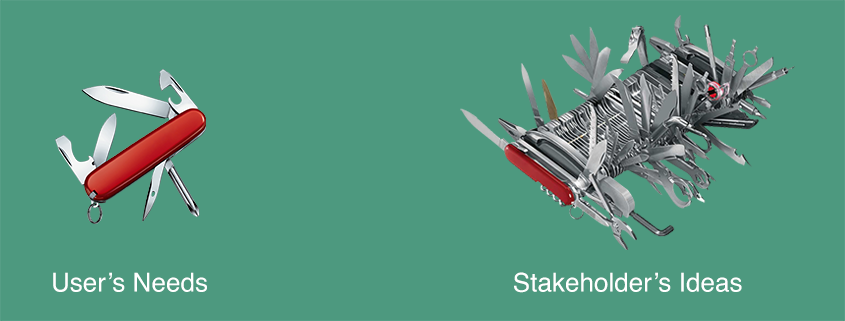The Over-Designed Product and Other Lessons on Feature Creep

The Over-Designed Product and Other Lessons on Feature Creep
More than once when considering the purchase of a software product, I have set aside the feature-heavy package for a simpler version with a better price and better mix of key functionality. More often than not, the package I choose has the core features that sold me on the product in the first place. More often than not, the features added to later versions of the same software are neither necessary nor helpful to the overall user experience.
The result of a common market phenomenon known as “feature creep,” these extra features were added to enhance the product, but actually diminish its value by adding too much complexity and cost. Few consumers purchase the more elaborate product, at which point it starts a slow but sure trek from sale bin to discontinuation. What sets apart the doomed “bloated” products from those that enjoy a long and productive shelf life? How can a corporation avoid “featurism” by packing too much of a good thing into an otherwise solid product? Here are a few points on how to stack the deck in your product’s favor.
Data is King: The Indisputable Value of Market Research
The ultimate goal of market research is to uncover hidden, but invaluable truths about your target industry. In unlocking the secrets to your primary consumer (and potentially striking market “gold”) you discover needs, difficulties, typical workflow processes, and key goals. Make use of quantitative and qualitative market research techniques to get answers to foundational questions. Primary research uses focus groups, surveys and well-designed questionnaires; secondary research pulls from existing articles, reports and analyses. At the conclusion of a thorough process, a road map to deliver needed help to your target consumer should be clear.
Identify key problems you are trying to solve for this industry. Prioritize the challenges and issues that are of primary importance and those that are secondary. Your target customer’s problems are front and center in the product development process and the driver behind effective product design. Don’t lose sight of them.
Make an Execution Plan
Outline a scope of work to develop a product that solves a key challenge for your target group. The plan of work will be based on conclusions derived from market research and objectives to incorporate key functionality and core features. Set a timeline to achieve major milestones and don’t stray from these target dates. You are incorporating non-negotiable, “bread and butter” features into your product and that is the end game. If you still have too many features to work with at this point and need to narrow the field, determine which features are more valuable to your target user than others. The use of a Pareto analysis, in which you attempt to identify the minimum features (20%) that generate the majority (80%) of the value, can be useful here.
Consider the development of an MVP (Minimum Viable Product) at this stage as well.
If you Make it, Will they Buy?
The MVP is a bare-bones product with minimal up-front investment that indicates whether market research was nailed-or not. Targeted to a specific, well-researched group of consumers, the MVP could be the winning ticket—the long-awaited product that has been tailored to meet a specific need—or a real loser. The MVP gauges viable market interest and either establishes a receptive customer base or not. If it fails, anything more elaborate will fail too. The company will decide to go forward with the product as is, change it, or discontinue production altogether
Let Data Drive Design and Product Development
Let’s say the MVP is a success and the pressure is on to firmly establish market share. A common presumption is that more features result in a better product. Corporate development and design teams ramp up, ready to shift into high gear with “better” features and greater functionality—but this is where feature creep becomes a real risk. Make sure data-driven review processes are in place to analyze the risk and value of proposed new features.
Considerations should include user need, effects on user experience, and how a proposed feature adds or detracts from existing product design.
Keep budgets, corporate resources and timelines in mind. Continue to follow initial project goals and priorities. Early market research uncovered important truths about your customer base and data on user behavior should continue to drive design decisions. Consider analyses showing each of the product’s features with the percentage of users for each. Features with poor rates of use should be eliminated. These data and others will yield important information on product design moving forward.
The Value of a Simple Design
Failure to plan or follow a process for feature review and analysis can result in wasted corporate resources, missed deadlines, a product that no one wants, and irreversible financial losses. Thorough market research and planning and project objectives that keep the end user in mind at all times are essential to avoid feature creep. Don’t dismiss the value of a simple and user-friendly product that delivers a basic solution and does little more. Don’t dismiss a minimalist, yet effective, design strategy. Years from now, we will undoubtedly observe that the simple tools are the ones that outlast the complex.






